Muscle Chemistry Archive
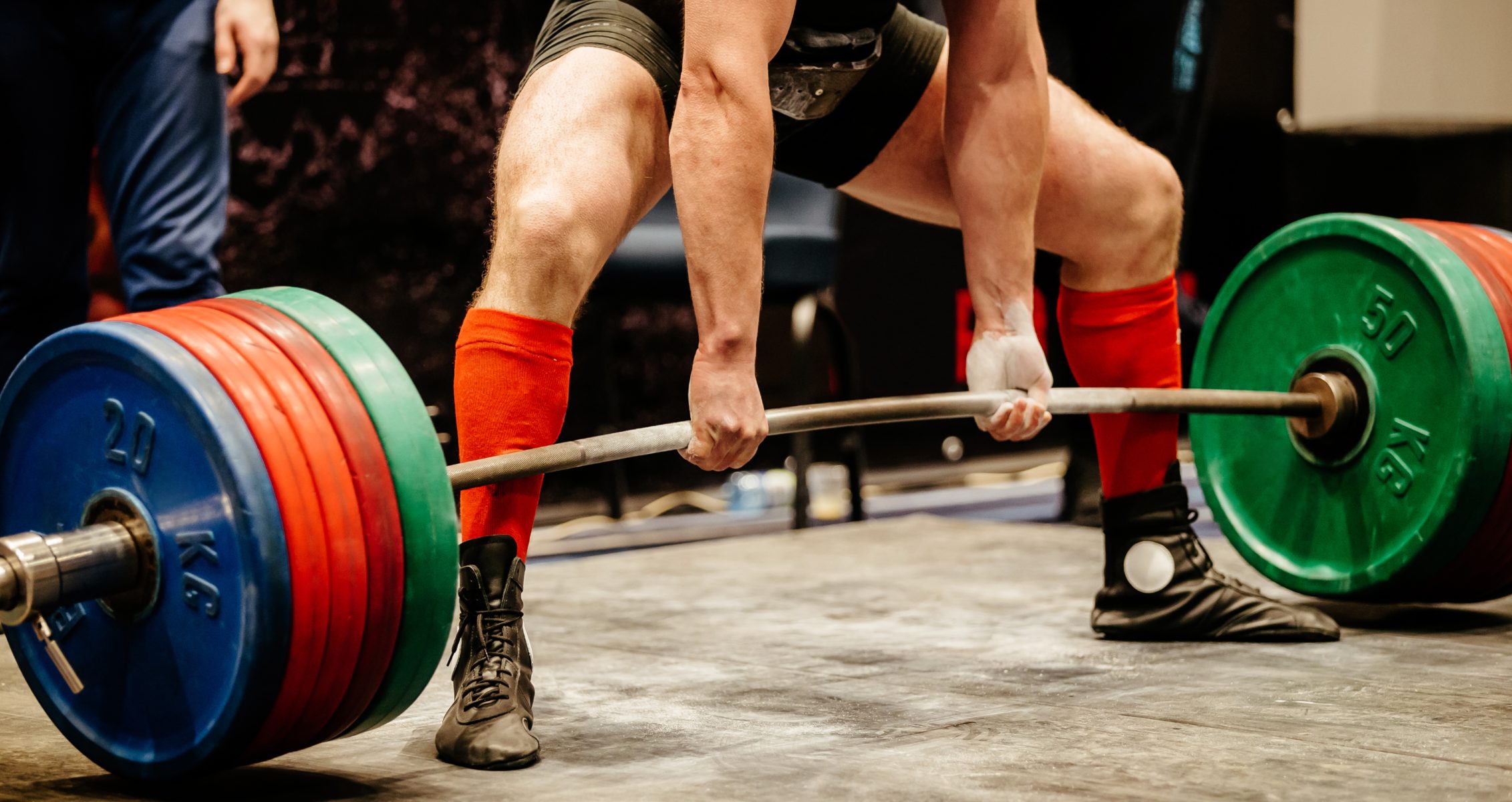
Engineering the Perfect Deadlift
Work to perfect this massive lift to boost all your gains.
The deadlift is the single most effective exercise in your training tool-box. However, if done incorrectly, it’s a back injury waiting to happen. In this article I’m going to break down what the deadlift is and how to properly execute it.
What Is The Deadlift?
The deadlift is a true full body exercise. While most people would consider it a “back” exercise, others will argue that it’s a “leg” exercise; in my book, it’s an everything exercise.
Why Is The Deadlift So Great?
When you deadlift you use every single muscle in your body. Your arms and forearms hold onto the barbell, your shoulders and traps hold and stabilize the weight, your back and core help keep your entire body stable, and your legs and entire posterior chain act as a lever to lift the weight.
On top of that, the deadlift is a basic human movement. From moving a piece of furniture to picking your child up off the floor – you are deadlifting. As you build solid form deadlifting in the gym, your form for deadlifting in real life will also improve. This means you’ll be less likely to injure yourself now and later down the road.
Steps To Perform The Deadlift
Here’s how to do a conventional barbell deadlift:
Stand mid-foot under the barbell. Feet slightly angled outward, hip width apart. Look down – the bar should be over the middle of your feet.
Bend over and grab the bar with a shoulder-width grip.
Bend your knees until your shins touch the bar.
With a neutral spine, lift your chest up and flex your butt.
Take a big breath, hold it, and pick the bar up off the ground (It helps to think “drive through your heels”).
Continue pressing with your legs and thrusting your hips forward until you are fully standing up.
Hold the weight for a second at the top, with locked hips and knees. Then return the weight to the floor by moving your hips back while bending your legs. Rest a second at the bottom and repeat.
The fastest way to increase your deadlift is by improving your form. By pulling more efficiently you can deadlift heavier weights. This results in more strength and muscle gains.
[embedded content]
Common Deadlifting Questions
Should I use straps while doing deadlifts?
Probably not. Straps will let you lift more than your hands can hold with a regular overhand grip but relying on straps will cause your grip strength to be undeveloped down the road. You’re better off developing your grip strength alongside your deadlifts. Plus, you’ll get beefy forearms in the process.
Do I need to use a lifting belt?
When starting out, you don’t have to worry about using a belt. However, as you get into really heavy weights, it may be something to look into.
Wearing a lifting belt reduces the amount of spinal flexion, spinal extension, and lateral flexion of the spine, but increases the amount of flexion at the hips and knees. In other words, a belt forces you to lift more with your legs than your back, which is precisely the biomechanical position you want to use when lifting something from the ground.
Check out this list of the Best Weightlifting Belts for great belts!
What kind of shoes should I wear to deadlift?
It doesn’t really matter what kind of shoes they are, as long as they are flat. Do NOT wear running shoes or athletic shoes with those pockets of air bubbles in the heels. You really have three options for deadlifting shoes:
Flat Shoes – Converse by Chuck Norris work great.
Deadlifting Shoes – Getting a bit fancy here, but if you are competing or just want the best possible shoes you can deadlift in, consider deadlifting shoes (also called weight lifting shoes).
Barefoot – If you don’t want to invest in new shoes, deadlift barefoot (or in socks if the gym floors are particularly dirty.
[embedded content]
The Bottom Line
The benefits of deadlifts are numerous, ranging from improved athletic performance to muscle growth and increased strength. The deadlift works your glutes, hamstrings, quadriceps, abdominal muscles, lower back muscles, back muscles like the latissimus dorsi (commonly known as the lats), and your forearms since you have to hold onto the bar to prevent it from slipping out of your hands. Since there are many muscles incorporated in the deadlift, you can lift more weight than many other exercises. This makes the deadlift ideal for building muscle and strength.
However, if performed incorrectly, deadlifts can lead to muscle tweaks, pinched nerves or other serious injuries to your back. But don’t let that scare you, follow the tips outlined in this article and you’ll be good to go.
Let us know what you think in the comments below. Also, be sure to follow Generation Iron on Facebook, Twitter, and Instagram.
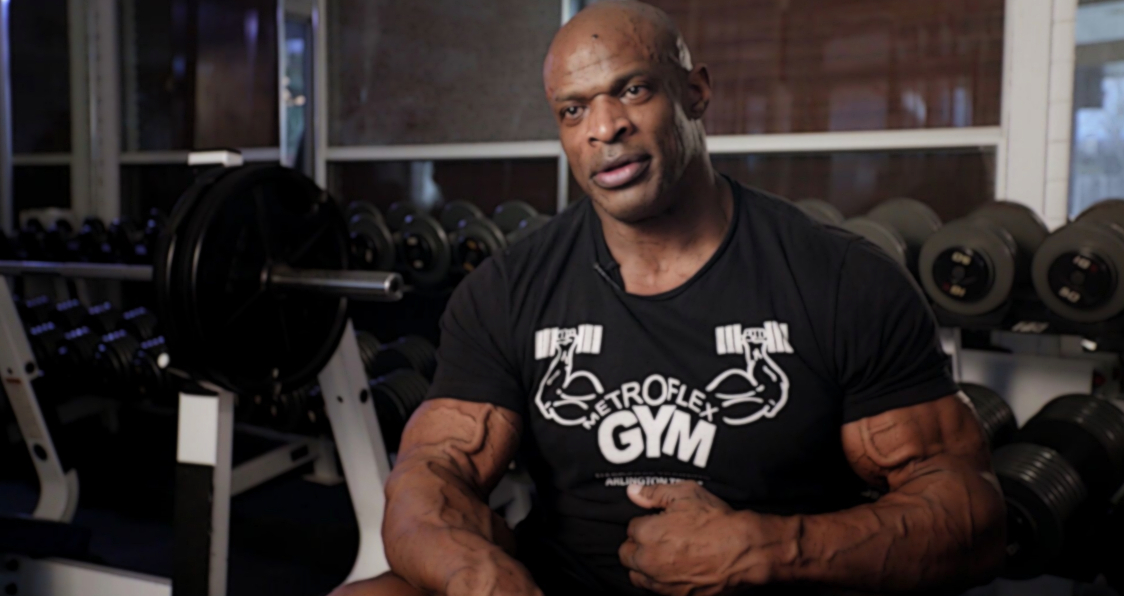
Do These Bodybuilders Make Ronnie Coleman Look Small?
The opinions in this article don’t reflect the opinions of Generation Iron
Is It Possible? Five Bodybuilders Who Dwarf Ronnie Coleman
Ronnie Coleman beat Arnold Schwarzenegger’s record for the highest number of Mr. Olympia wins by bringing the Sandow home 8 consecutive times. Ronnie Coleman along with Dorian Yates and Jay Cutler is credited with bringing the ‘mass movement’ to bodybuilding.
While Ronnie Coleman has the record for the most number of Mr. Olympia wins (tying with Lee Haney), there certainly are bigger and more muscular guys than him out in the wild. In this article, we won’t be considering bodybuilding titans like Dorian Yates, Jay Cutler, and would be focusing on lesser-known bodybuilders and athletes.
Gunter Schlierkamp
Gunter Schilerkamp is nicknamed ‘The Gentle Giant’ and has given Ronnie Coleman a run for his money on multiple occasions. Gunter started his bodybuilding career when he moved from Germany to the United States in 1996.
Schlierkamp trained with the famous trainer Charles Glass in 2002 after which he finished first in the GNC Show of Strength competition beating the reigning Mr. Olympia, Ronnie Coleman. Unfortunately, Gunter couldn’t repeat this feat in the Mr. Olympia contest.
Greg Kovacs
Greg Kovacs was a Canadian bodybuilder who held the title of the ‘Strongest Body Builder Alive’. In the late 90’s because of his sheer size, Greg was also considered the largest pro bodybuilder.
According to Muscle Insider, Greg weighted 420 pounds offseason and his competition weight was 330 lbs. At the prime of Greg’s career, his arms measured 27 inches and his chest was 70 inches. Kovacs passed away at the age of 44 due to a cardiac arrest.
Craig Golias
You have probably seen Craig Golias in various memes but didn’t know who it was, until now. Golias stands at six feet and three inches tall and weighs 350 lbs. Craig competed as a bodybuilder when he weighed around 200 lbs but quit competing when he left humanity behind.
In an interview with the YouTuber, Luimarco, Craig stated he eats four meals a day and still maintains his superhuman mass. The next time you see this meme, you know how big Craig is.
Martyn Ford
Martyn Ford is no ordinary human. Although the next two athletes are not the typical ‘bodybuilders’ like Ronnie Coleman, they can easily dwarf the legend. Martyn Ford has landed roles in several movies because of his insane physique and tattoos.
Ford is 6’8″ tall and can dwarf the majority of the people around him. Martyn Ford was training as a professional cricketer when he was injured and couldn’t continue the sport. He was determined to find a new passion, and bodybuilding found him.
Olivier Richters
A young Dutchman by the name of Olivier Richters is probably the tallest bodybuilder in the world. Olivier can make modern-day strongmen and bodybuilders like Thor Bjornsson and Martyn Ford look like midgets.
Richters is seven feet and two inches tall and weighs in at around 300 pounds. Olivier Richters is busy doing TV commercials and movie work in Holland and occasionally competes in bodybuilding contests. Like most giants, Olivier plans on becoming the next WWE sensation and a Hollywood star.
Who else do you think should be on this list?
Let us know in the comments below. Also, be sure to follow Generation Iron on Facebook and Twitter.

Top Signs Of Overtraining And How To Avoid It & Tackle Fatigue
Overtraining can throw you out of your rhythm and is experienced by all, but there are ways to fight back.
When we are feeling good, all we want to do is continue training at that high level. When we start getting weak and lethargic, we often question why. We seem more fit and can lift more weight, but all of a sudden we feel weak and our training seems to turn against us. Overtraining is a real thing and can happen to everyone, but there are ways to spot it and avoid making negative progress, especially with your heart rate, training, and recovery to avoid unwanted stress.
This occurs when we do not allow ourselves enough recovery time in between training sessions (1). While people preach about how exercise is so beneficial for your health, those of us who work out often and at high intensity, can actually be harmed by the heavy load of stress and strain we put on our bodies. Too much of anything can be harmful for our bodies and that includes exercise. While we may not want to admit it to ourselves, sometimes we tend to push our bodies to the limit, and then some with our training and stress.
While many factors can contribute to overtraining, there are two main causes, which are actually quite simple. Too much exercise without enough recovery is a big reason why this occurs (2). To push your body to the limit requires just as much recovery time to heal strained muscles and recharge those energy levels to safely and effectively hit the next day just as hard. Not getting enough fuel by shorting ourselves of much needed vitamins and nutrients, or straight calories for that matter, can lead to overtraining as a result of your body taking from much needed energy stores to power a session. Once those are depleted, your body looks elsewhere and often times places you do not want taken from during your training for athletes.
Noticing the signs and symptoms of overdoing it is important to stopping the trend of repeated overtraining. Taking note on how to avoid overtraining is also key in developing a solid workout routine to ensure you never over train to stay on top of your game and avoid those negative symptoms. While no day is perfect, we can do our best to stay sharp when it comes to our health and our training for athletes through exercise.
Signs Of Overtraining
High Heart Rate
A high resting can be one of the signs and symptoms of overtraining and is not great for your overall health so listen to your body. A higher resting heart rate means the heart is working itself to hard while not efficiently pumping blood. This leads to many parts of your body starving for solid blood supply, and with your heart being more than important to your overall health, it is not worth risking the quality of this vital organ so listen to your body and watch your training load to not overrun your nervous system, especially with endurance athletes through tough exercise.
Fatigue
That excessively drained feeling during or after a workout is fatigue and can happen when you aren’t fully recovered, so rest and recovery is vital to include in your training program to avoid chronic fatigue. While we all feel tired after a workout, fatigue is that extra level of sluggishness you just can’t seem to shake. Without proper fuel, your body resorts to all other options to find energy leaving you with a tired feeling even before you begin your exercise which can affect your mood (3).
Decreased Appetite & Weight Loss
This can lead to hormonal imbalances which has significant effects on how hungry or full you feel. While increased training should in effect increase your appetite, the physiological tired feeling experienced can lead to suppression and ultimately weight loss without proper care and sports medicine would advise against that with exercise.
Increased Efforts In Workouts
Some of those exercises you used to do effortlessly may now seem twice as difficult. Your perceived effort may make you think you are training harder than you actually are and an increased resting heart rate plays a role in this as well.
Poor Sleep
We all know sleep is vital to not only power us through a workout, but also function in everyday life. Overdoing it has a serious effect on your stress hormones which do not allow you to fully relax making sleep incredibly difficult (4). During sleep, your body finds time to rest and repair itself and without proper sleep, you won’t fully recover or rest to your full potential and sports medicine strictly encourages rest with enough time to recover so your immune system and mental health stay high, and quality sleep is assured through complete rest.
Tips To Avoid It
Rest
It is important to give your body adequate rest time in between training sessions, in particular more difficult ones. If the amount of training starts to exceed the rest time, you run the risk of training too hard. If you need to take a break from training to give your body the proper rest (5), then do it because it will only benefit you in the long run as you decrease your load to see increases in those gains.
Reduce Volume
If you are really not fond of totally taking time off, then consider reducing the volume of your training. This way you stay moving without the added strain that caused the this in the first place. This is a great time to strengthen your mind-muscle connection so when you are back in the gym and ready to work hard again, you will have the skills to do so to maximize your gains. Less soreness increases your chance at a faster recovery.
Self-Care
Be kind to your body and stretch. Use a foam roller or research good stretches to target certain muscles or areas that may be particularly sore. If a massage seems appropriate, schedule an appointment and give your body that needed TLC to even take a second of your day to come back to normal.
Proper Diet
Arguably the most important tip to avoid overtraining is to give your body the proper fuel to work hard and function every day, as well as aid in recovery (6). Make sure you get the proper nutrients in your diet to provide you ample fuel for those grueling workouts. Protein, carbs, and fats can all benefit your growth and if you choose to diet, make sure you research the best way to do so to avoid overtraining and keep seeing growth at a high intensity with great response so you see results and bigger muscles in the gym.
Wrap Up
Overtraining can be tough on all of us. That sluggish slump mixed with low confidence and poor attitude can hurt our progress in the gym and strain relationships in everyday life. It is important to notice the signs as fast as you can to avoid falling deeper into a hole. That tired feeling, increased effort, and poor sleep are just a few things to watch out for to spot when your getting close to over-trained. When it strikes, focus on rest and a healthy diet and don’t be afraid to take a break. Giving your body time to recharge will pay off way more in the end than fighting through it. Overtraining happens, but it doesn’t have to totally stunt all of your hard work and leave you with the need to feel content to find that long lasting result to keep you working hard without an excessive period of fatigue and psychological despair.
Let us know what you think in the comments below. Also, be sure to follow Generation Iron on Facebook, Twitter, and Instagram.
*Images courtesy of Envato
References
Fry, Rod W.; Morton, Alan R.; Keast, David (2012). “Overtraining in Athletes”. (source)
Eichner, E. R. (2008). “Overtraining: Consequences and prevention”. (source)
Gleeson, Michael (2002). “Biochemical and Immunological Markers of Over-Training”. (source)
MacKinnon, Laurel T. (2000). “Overtraining effects on immunity and performance in athletes”. (source)
Roy, Brad A. (2015). “Overreaching/Overtraining”. (source)
Alexandrova, Albena; Petrov, Lubomir; Zaekov, Nikolay; Bozhkov, Borislav; Zsheliaskova-Koynova, Zshivka (2017). “Nutritional status in short-term overtraining boxers”. (source)

A Complete Guide To Protein Supplements
Vital for growth and recovery, knowing the ins and outs can boost your training and performance.
Table of Contents
It may seem like there are too many supplements to consider when looking to boost our overall health and performance. Everything from pre-workouts, to multivitamins, fat burners, testosterone boosters, omega-3s. and more, the options are endless and the search can be tiresome. But out of all these supplements, one stands out as being the most essential, at least in our opinion, for it provides benefits not only to your health and wellness, but also your training and performance. A protein supplement has the ability to transform your gains, improve recovery, and make you feel accomplished after leaving the gym.
Now, there are ungodly amounts of protein powders and other forms on the market. Some come from reputable brands while others are of more poor quality, but that doesn’t mean you have to spend a fortune for a good quality supplement. We know most of you know what a protein supplement is, but for those who don’t, this complete guide can be very helpful. And if you do already know, maybe you’ll learn something you didn’t.
This complete guide will give you everything you need to know about protein supplements so you can get this handled right away. From what they are, to the mighty benefits, key ingredients, and its effectiveness, you won’t be disappointed when you invest in a great protein supplement for yourself.
What Is A Protein Supplement?
A protein supplement is typically a powder used post-workout to help with muscle protein synthesis and recovery. It is also used as a dietary supplement to add more protein into one’s diet if they are lacking. Since protein itself can help keep you full, this is used as a meal replacement at times for those on the go who need a healthy and filling snack. Made from all sorts of sources, the benefit of protein powders is that companies have now begun to include more plant-based products so everyone can benefit from a great supplement.
Benefits Of Protein Supplements
Let’s take a look at some of the many benefits that protein supplements can provide.
Increase Muscle Growth
Protein is the building block of all muscle and amino acids are what makes this important. There are nine essential amino acids (EAAs) that are important to focus on and of those nine, there are three branched-chain amino acids (BCAAs) that are vital as well. What protein supplements do is they stimulate the process of muscle protein synthesis to really work to build that desired muscle. Along with strength training and a good diet, this is very much possible (1).
Aid In Recovery
We all know how it feels after a grueling day in the gym. Protein is essential when it comes to repairing damaged muscles and tissues and working on speeding up the recovery process so we bounce back faster for the next workout. When taking these supplements right after exercise, it can help reduce that muscle damage and soreness that you just don’t want and will also work with muscle protein synthesis to build that muscle faster for less inflammation (2).
Promote Fullness & Help With Weight Management
Protein is essential in working to keep you more full and for longer, making protein essential either as a meal or a supplement. When it comes to weight loss and weight management, protein is vital for this reason. It works to eliminate snacking and keep you full longer so you can work to stay on a good dietary schedule for yourself (3).
Convenient On-The-Go Meal Option
For those with busy schedules, finding the time to properly care for yourself with a good diet can be difficult. Protein supplements are good on-the-go options for they can be mixed with milk or water and can work to effectively offer a decent meal alternative if need be.
Different Sources Of Protein
With these supplements being produced from many different sources, the options for those on a plant-based diet are still great and can offer the same benefits as those looking more for whey protein.
Whey Isolate: A more filtered form of whey protein, what you’ll find is a higher percentage of protein and little to no fats or carbs. This is a great protein source for those looking to cut or get lean since it is mostly protein (4).
Whey Concentrate: Great for those looking to bulk, you get a healthy dose of carbs, fats, and plenty of protein to pack you with all three macros. It will provide similar benefits to whey isolate.
Brown Rice Protein: With a high amount of BCAAs present, brown rice protein is a great plant-based source to provide for all the benefits of a whey protein minus the dairy. With no irritants, you know you are getting a high quality protein.
Pea: Typically extracted from yellow pea, pea protein can be used as another great alternative for plant-based proteins. It also contains all nine EAAs that your body can’t create on it own (5).
Safety & Effectiveness
Protein supplements are incredibly effective supplements and should be considered by all when looking to boost their training and performance, as well as overall health and wellness. They are on the whole very safe, but it is always important to look into your supplements and to read the labels to see what added ingredients may be included that could harm a great product. For optimal effectiveness, look to take a protein supplement within an hour after you’re done working out.
Wrap Up
Protein supplements are vital for helping improve our training and performance, increase muscle growth, aid in recovery, promote better weight management, and a host of other incredible benefits we cannot let go unrecognized. Finding the right supplement can be a challenge but it is out there. Whether you’re looking for something more plant-based or are comfortable with whey protein, the options are endless and you won’t be disappointed with the results. Look into a great protein supplement today and really see what these can do for all areas of a healthy lifestyle.
Check out our list of the Best Protein Supplements for great protein products!
Let us know what you think in the comments below. Also, be sure to follow Generation Iron on Facebook, Twitter, and Instagram.
*Images courtesy of Envato
References
Pasiakos, Stefan M.; McLellan, Tom M.; Lieberman, Harris R. (2015). “The effects of protein supplements on muscle mass, strength, and aerobic and anaerobic power in healthy adults: a systematic review”. (source)
Pasiakos, Stefan M.; Lieberman, Harris R.; McLellan, Tom M. (2014), “Effects of protein supplements on muscle damage, soreness and recovery of muscle function and physical performance: a systematic review”. (source)
Paddon-Jones, Douglas; Westman, Eric; Mattes, Richard D.; Wolfe, Robert R.; et al. (2008). “Protein, weight management, and satiety”. (source)
Pal, Sebely; Ellis, Vanessa; Dhaliwal, Satvinder (2010). “Effects of whey protein isolate on body composition, lipids, insulin and glucose in overweight and obese individuals”. (source)
Babault, Nicolas; Paizis, Christos; Deley, Gaelle; Guerin-Deremaux, Laetitia; et al. (2015). “Pea proteins oral supplementation promotes muscle thickness gains during resistance training: a double-blind, randomized, Placebo-controlled clinical trial vs. Whey protein”. (source)
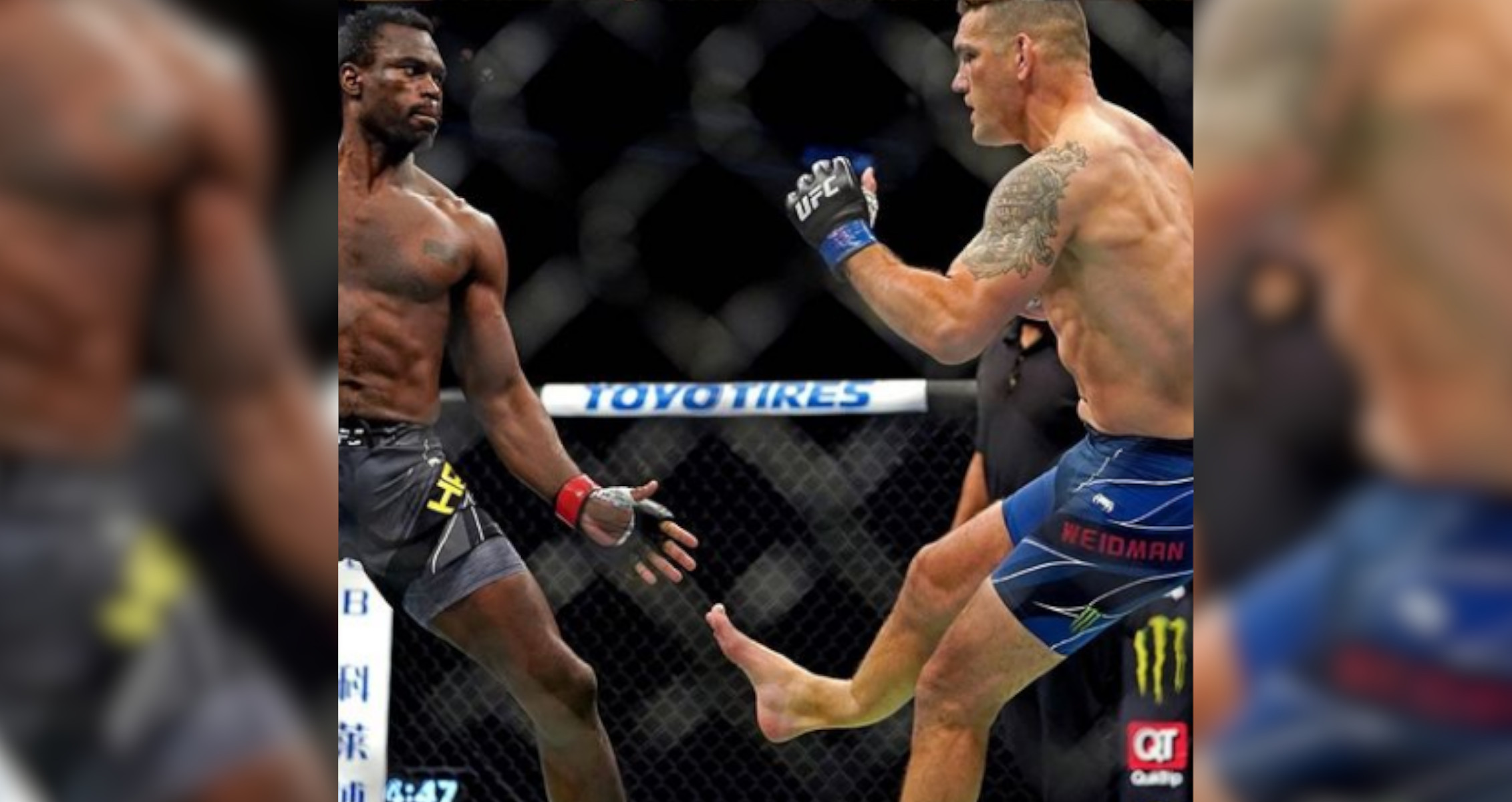
NSFW! After Horrific Leg Break Chris Weidman Has Successful Surgery
Chris Weidman reports successful surgery after horrific leg break.
This is indeed the hurt business. Former UFC middleweight champion Chris Weidman had the unfortunate luck of experiencing the most extreme case of that at UFC 261. Weidman suffered a horrific leg break after having his kick checked/blocked by opponent Uriah Hall. While it was certainly a terrible turn of events for the former champ, Weidman has reported that his surgery to repair his leg was a success.
Reminiscent of his now infamous rematch with Anderson Silva, Chris Weidman got his leg broken when he attempted to kick his opponent in the opening round of their bout. A simple leg check was all it took to break Weidman’s shin bone. While it was indeed a legitimate technique, it certainly unfortunate to see things unfold that way.
Dana White reported that was the first time a UFC fighter won a bout without ever throwing a strike.
The event was also eerie in another way as well. The irony can not be denied when we consider that Anderson Silva had his leg broken in the same manner when fighting Weidman at UFC 168. Both men have now experienced the exact same injury to the same leg under the same circumstances. It’s not something you see every day.
NSFW
The post below shows how Chris Weidman injured his leg during the bout.
This post shows how similar the situation was when compared to the Anderson Silva break.
But while the leg break was indeed horrific and hard to watch, there’s good news to report. It appears that Chris Weidman has had a successful leg surgery. The former UFC champ gave an update on his social media and he appears in good spirits.
The Generation Iron team wishes Chris Weidman a speedy recovery. Hopefully this won’t deter him from making his way back into the octagon for another go.
For more news and updates, follow Generation Iron on Facebook, Twitter, and Instagram.
Managing Editor at Generation Iron, Jonathan Salmon is a writer, martial arts instructor, and geek culture enthusiast. Check out his YouTube, Instagram, Twitter, Facebook, and Sound Cloud for in-depth MMA analysis.
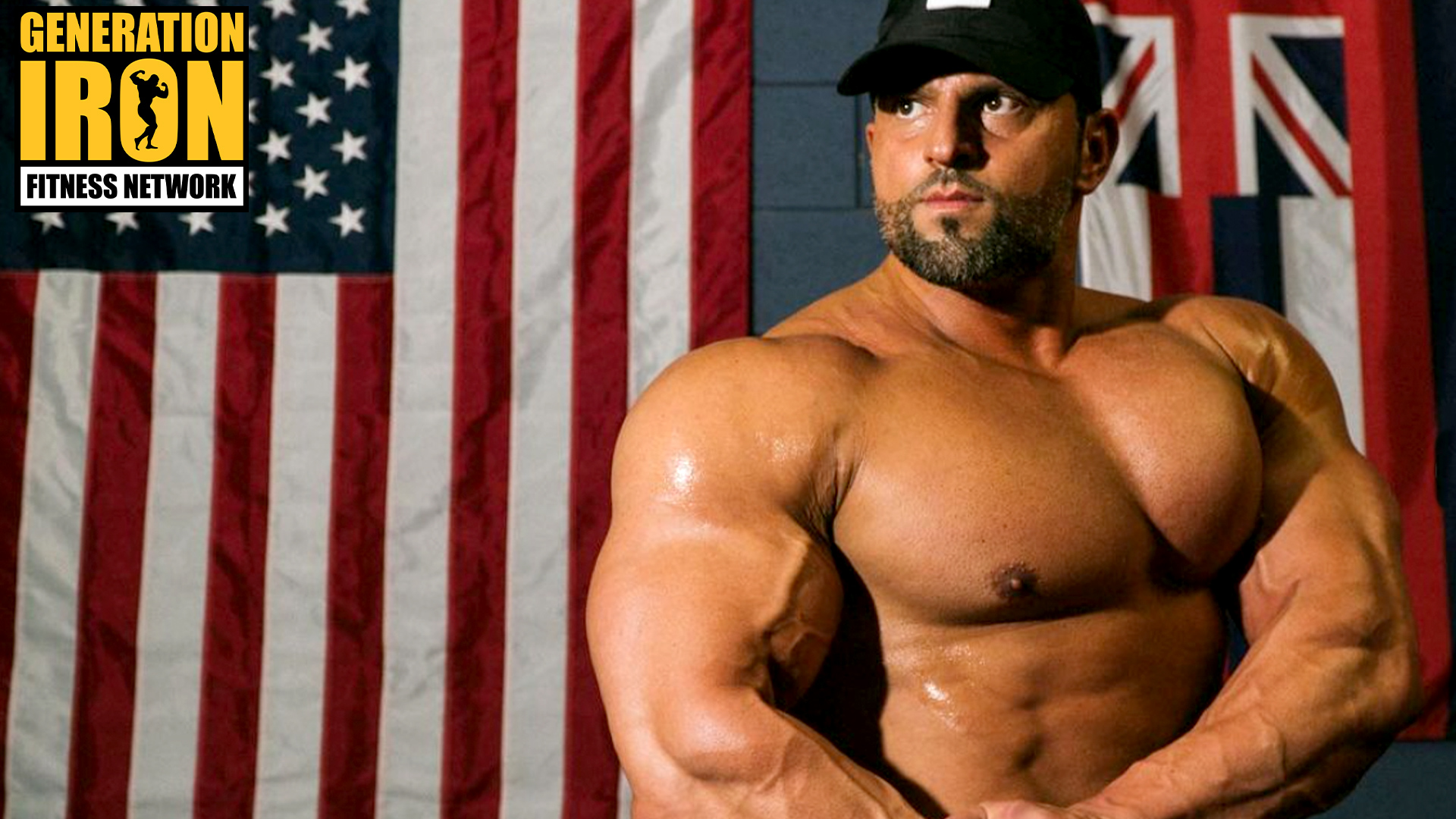
Arash Rahbar: The Thing Fans Get Wrong About Judging Bodybuilding Physiques
Arash Rahbar goes in-depth about the Classic Physique Olympia 2020 results and the biggest mistake fans make when judging physiques.
The Classic Physique Olympia 2020 was, to many, a shocking outcome. While there was a strong chance Chris Bumstead would win again, no one was expecting Breon Ansley to fall down to third place. There were some who felt that the drop was unfair to Breon. That the judges are favoring a certain “kind” of physique. Arash Rahbar is here to put that thinking to bed. In our latest GI Exclusive interview, Arash Rahbar explains the biggest disconnect between how judges rate physiques vs how fans rate physiques.
Chris Bumstead and Breon Ansley have different looking physiques. That doesn’t mean one is vastly superior to the other. It just means they both have extreme strengths with an overall different aesthetic. Part of that difference is due to Bumstead’s tall height – which is rare in the bodybuilding world. Regardless, the difference in physique aesthetic could pose a problem for judges. How do you compare such talented competitors who look so different?
This has been a discussion that is particularly pointed in the Classic Physique division. Partially because the division is still young and partially by the very nature of the rules in the division. Classic Physique’s focus on weight limits based on height can yield a wider variety of aesthetics and looks on the stage.
Arash Rahbar thinks that Chris Bumstead was miles ahead the winner at the Olympia 2020. He thinks it was no contest and that Breon Ansley deserved the place he received. But many fans think that it was closer than that. Some believe that Breon should have at the very least gotten second.
[embedded content]
Watch our latest GI Exclusive segment with Arash Rahbar above!
During our conversation with Arash, we asked him how judges can overcome the challenges of judging such vastly different aesthetics on the stage. Arash Rahbar points out that it’s not really that complicated. The only reason it seems complicated is due to a fundamental misunderstanding on how many fans look at competitions.
As fans, we are sucked into the entire spectacle of a bodybuilding competition. Fans choose sides. They not only chose favorite physiques – but when they do the bodybuilder’s personality comes into play. Over time, when a person becomes a fan of a bodybuilder, they become a fan of their whole package. Their physique and their lifestyle and their personality.
So when people tune into a live stream or look up photos from a competition – fans often still see the whole package. While it’s important for a bodybuilder to have a perfect physique from top to bottom – the mandatory poses present a very specific purpose.
Arash Rahbar discusses how each mandatory pose is to judge that single specific comparison of muscle. So when bodybuilders do, let’s say, a front double bicep in a comparison round – judges essentially blank out the face of each bodybuilder. They ignore the whole package and focus on how good that pose looks next to the other person.
Arash Rahbar recounts many times that he would think one bodybuilder was looking “weak” on stage overall. But when he started seeing the side by side comparisons of each pose – he changed his tune. Suddenly that bodybuilder is he clear winner. It’s clear because he presented his physique superiorly in each shot of each pose.
Arash Rahbar thinks fans often miss that level of detail. That they still take into account, consciously or subconsciously, the whole physique and even the personality into consideration. We are constantly blinded by our own personal bias.
You can watch Arash Rahbar explain this in more detail by watching our latest GI Exclusive interview segment above!
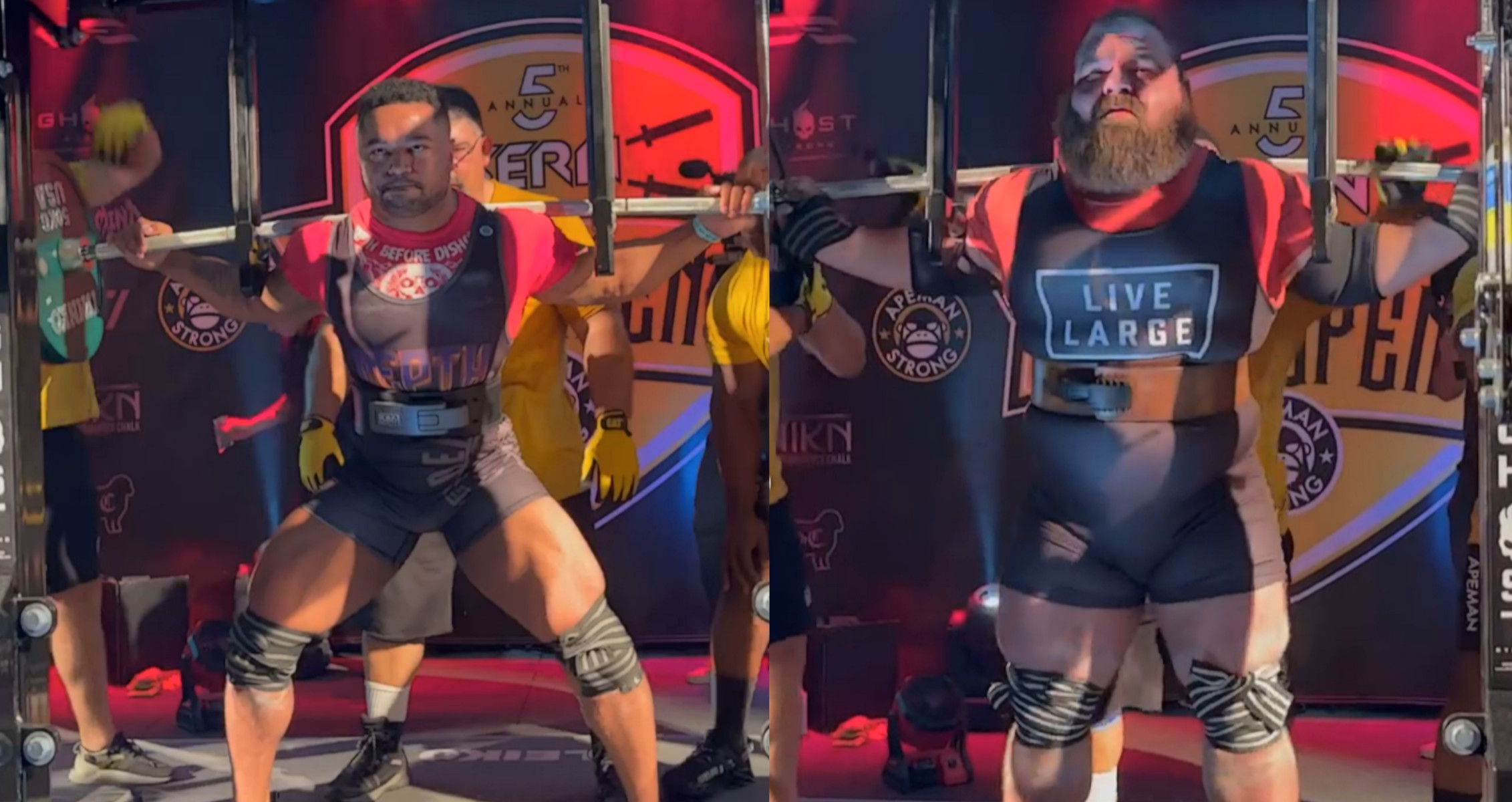
Daniel Bell and Chad Penson Crush Raw World Records At Kern US Open
Daniel Bell and Chad Penson showcased superhuman strength at the Kern US Open.
The powerlifting world was treated to some of the most impressive performances ever this past weekend. Veteran powerlifters Daniel Bell and Chad Penson put up some incredible numbers at the Kern US Open. Both men shattered world records and once again cemented themselves as some of the best powerlifters on the planet.
The Kern US Open brought together a ton of great talent. Records both personal and world were crushed at this past weekend’s show. The powerlifter vet Daniel Bell once again showcased his top class strength at the show. He had already outdid himself back in February when he shattered the raw world record total. But it appears that once simple wasn’t enough for Mr. Bell.
At the Kern US Open the powerlifter set himself apart lifting some truly insane numbers. Here he is bench pressing 606lbs and making it look easy.
Daniel Bell also outdid himself with an all-time world record raw squat of 1,113lbs!
Bell wasn’t the only powerlifter to break all-time world records at the show. Chad Penson was able to break the all-time world record total in the 198lbs weight category. The powerlifter looked ultra impressive as he cleared every lift and made it look easy.
881 ATWR512 PR804 PR2197lb ATWR total at 198 and 642 Wilks #2 wilks of all time. 2021 Kern US Open champion. Humbled, grateful, but still hungry. Thank you Everyone. Im not don’t.. just getting started. Thanos came for the smoke twice.. see y’all at the Showdown in September ??
The numbers and feats of strength were truly something to behold. These two powerlifters exemplify what it means to be a professional strength athlete. We’ll no doubt be following both Daniel Bell and Chad Penson as they continue to break records.
For more news and updates, follow Generation Iron on Facebook, Twitter, and Instagram.
Managing Editor at Generation Iron, Jonathan Salmon is a writer, martial arts instructor, and geek culture enthusiast. Check out his YouTube, Instagram, Twitter, Facebook, and Sound Cloud for in-depth MMA analysis.
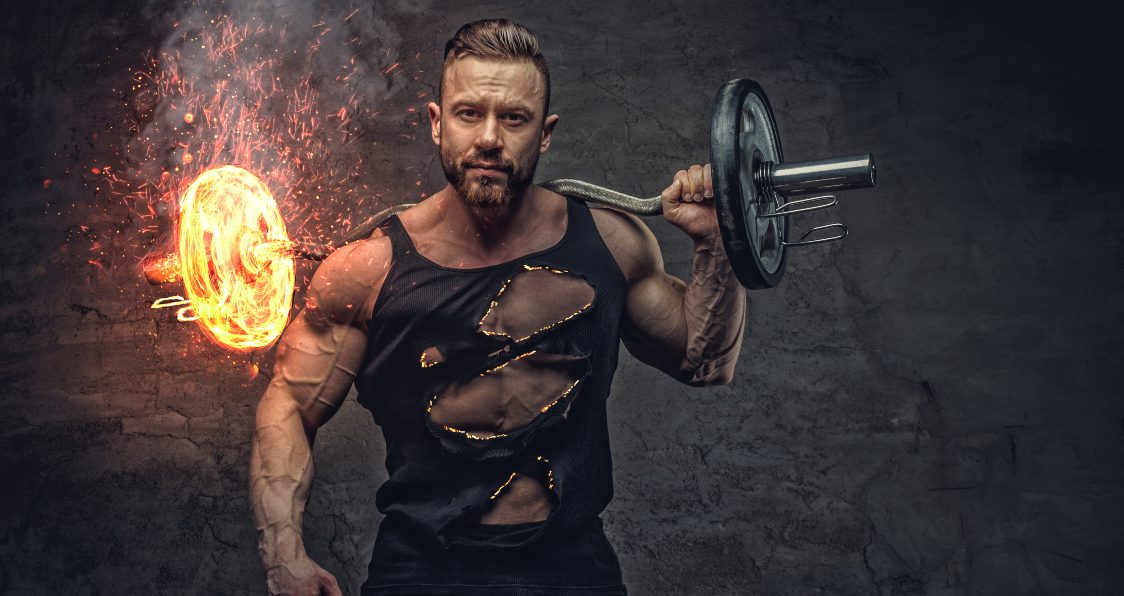
How The Viking Press Enhances Those Boulder Shoulders
Build Strongman-like shoulders with this massive exercise.
We’ve all seen those guys in the gym. Massive pecs, bulging biceps, everything we want most out of our training. But what makes that physique stand out are those boulder shoulders, those tiny mountains sitting beside their heads. It may seem easy to grow your shoulders, performing those staple exercises like front and side raises, a military press, or the upright row. While those are great, looking towards more massive lifts can really work to create those boulder shoulders. The Viking Press is a monster shoulder workout to give you Strongman-like strength and those desired rounded delts to really add to your physique. Plus, you look like a beast doing it.
When it comes to shoulder strength, there is way more to it than just looking good and pumping out that awesome physique. With strong, stable shoulders, you allow yourself to thrive with more functional movements, as well as those sport specific exercises we need most. Anything from throwing a ball to carrying groceries, all the way to lifting massive weights with the overhead press will all be enhanced (1). Preventing injuries is another key factor in shoulder strength and should not be overlooked. As connectors for our arms to our torso, keeping these muscles and the surrounding attachments stable and healthy is vital for really seeing that huge growth we want most. And to bring it back to physique, your confidence will improve with those boulders showing through.
Let’s take a look at the Viking Press and see what the hype is all about. From what it is, to muscles worked, the benefits involved, and how to perform it, this is something you may want to try in the gym for people to envy. And trust us, they will.
What Is The Viking Press?
The Viking press is one of those shoulder exercises you just can’t overlook. Perfect for those looking to master overhead training, this requires range of motion as well as strength to really get that weight lifted overhead. What it can do is seriously build shoulder strength and work to increase overhead mobility. By adding stress on your core, it requires that to be engaged so you can put the stress on your shoulders and not your low back (2).
The Viking press can be used with either two barbells parallel to one another, or with a certain attachment called the Viking attachment. What this does is connects to the barbell and offers two handles so you are only moving one barbell. Used for other exercises as well, the Viking attachment is not a bad piece of equipment to check out.
Muscles Worked
With the Viking press, primarily you target the shoulders, working to really capitalize on those boulder shoulders. Along with upper body muscles, you get some good work with the triceps and back to help stabilize and provide for extra support with the movement. Working to help stabilize, as well as working with a slight pumping motion, your legs will feel a slight burn which can be beneficial in the long run.
Benefits Of The Viking Press
Build Serious Strength
It probably goes without saying but working with a monster exercise like the Viking press can really build strength and size for a number of benefits towards your training and performance, as well as everyday life. By adjusting the weight accordingly, you can also work on mind-muscle connection since the movement is relatively simple to perform.
Easy On Your Wrists
For those worried or struggling with wrist pain, your wrists stay in a fixed position so you don’t need to worry about any extra movements. Another shoulder exercise like the Arnold Press is a great one, but tends to cause some wrist pain given the rotation. With this linear movement, you don’t have to worry.
Stability & Added Upper Body Support
As mentioned before, strong shoulders can aid in stability and work to be helpful with upper body support. You don’t want those shoulder joints to be vulnerable as they are necessary for many workouts, so looking to be proactive now pays off in the long run (3).
Boost Your Aesthetic With Those Boulder Shoulders
This is what we all want. Those massive shoulders to fill out that tight shirt and show off our gains. The Viking press can help round out and offer great support for those gains we want to see most.
How To Perform It
For those interested in the Viking attachment, definitely look into this and see what it can do for you. A great attachment, it can make this exercise and others more efficient to maximize gains. For this How-To, we’ll focus on if you don’t have the attachment, so this requires two barbells.
Place your two barbells on the rack parallel to one another with the desired weight on each. As you grip each bar, engage your core and stand in between the two. Giving a slight squat down, lift the bars overhead, extending your arms and working to lock them out. Once at the top, hold for a brief pause and gently lower back to the starting position. Repeat for your desired number of reps.
Wrap Up
When it comes to those boulder shoulders we all know and love, there are countless exercises we can do to help us get there. Some of the staples like a front raise, side raise, overhead press, and upright row are all great and should be included but the Viking press challenges you to get that Strongman-like strength and massive physique that people will envy. Having strong shoulders works for your benefit in a number of ways but what is more than important is knowing how to effectively work these muscles so you see the growth you want most. Check out the Viking attachment if that interests you and look to add the Viking press into your routine. You won’t be disappointed that you did.
Let us know what you think in the comments below. Also, be sure to follow Generation Iron on Facebook, Twitter, and Instagram.
*Images courtesy of Envato
References
Williams, Martin R. Jr.; Hendricks, Dustin S.; Dannen, Michael J.; Arnold, Andrea M.; Lawrence, Michael A. (2020). “Activity of Shoulder Stabilizers and Prime Movers During an Unstable Overhead Press”. (source)
Ghigiarelli, Jamie J.; Berrios, Xavier M.; Prendergast, James M.; Gonzalez, Adam M. (2020). “The Viking Press”. (source)
Jaggi, Anju; Alexander, Susan (2017). “Rehabilitation for Shoulder Instability – Current Approaches”. (source)
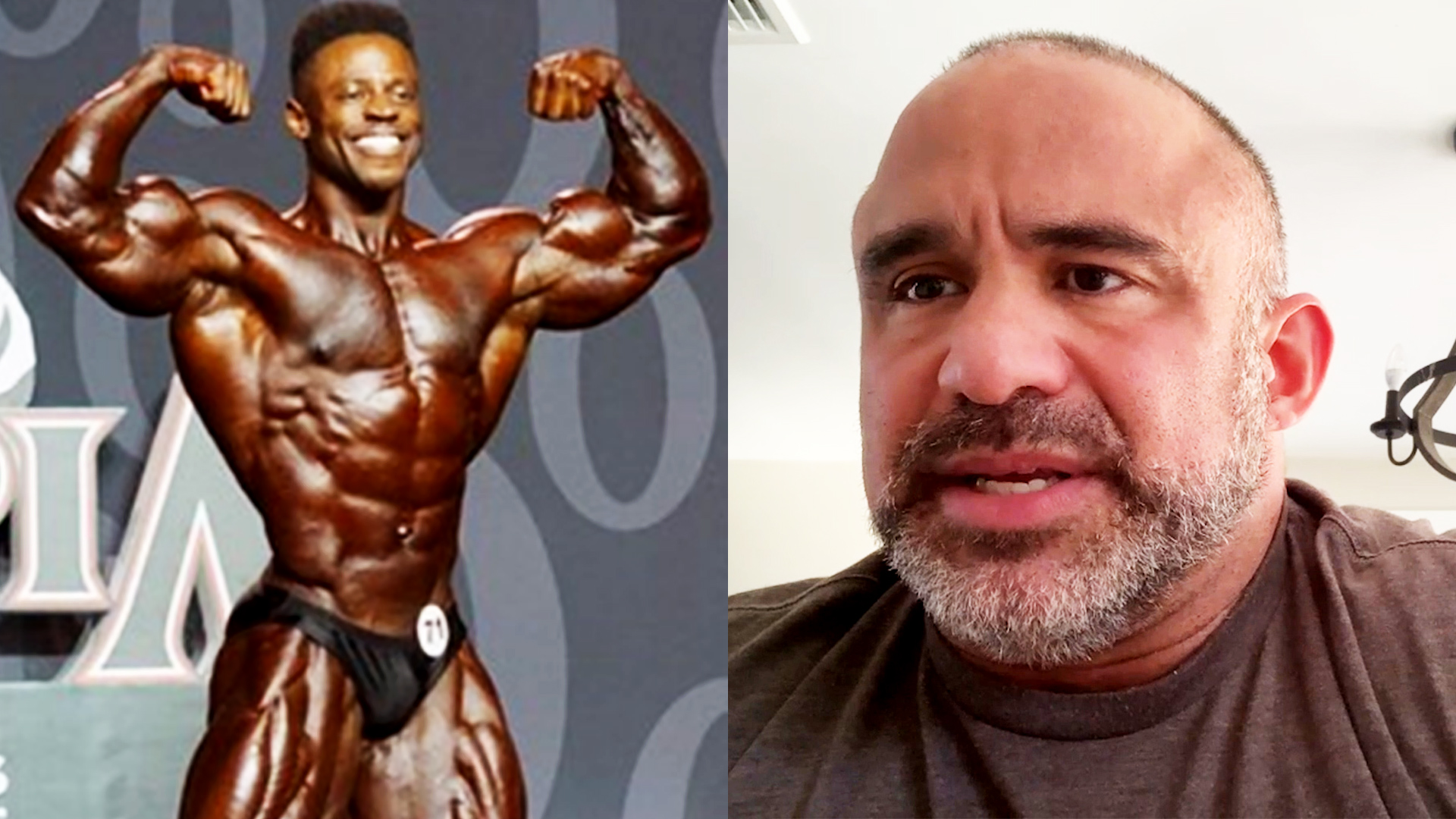
Jose Raymond On Breon Ansley’s Potential In Men’s 212: “I Don’t Think He Would Do That Well”
Jose Raymond shares his thoughts on the possibility of Breon Ansley moving up to Men’s 212.
Breon Ansley has hinted in the past that he might move up to the Men’s 212 division. Though ever since his loss at the Olympia 2020, he has confirmed he’s not changing divisions anytime soon – he still hasn’t ruled it out completely for his future. Some fans believe it’s the change he needs to become more dominant. Others disagree. In our latest GI Exclusive interview, Jose Raymond predicts that Breon Ansley would struggle to succeed in the Men’s 212 division.
Breon Ansley went into the Classic Physique Olympia 2020 looking for revenge. Not only that, he was looking to prove that he is the true and rightful reigning champ in that division. Instead, Chris Bumstead proved himself to be a repeat champion. This tied him for two Olympia wins putting this year’s upcoming Olympia into a true battle for supremacy.
But some fans see Breon Ansley’s third place finish last year as a sign that he is on the decline. Breon has hinted in the past that he was interested in moving up to Men’s 212. While nothing is confirmed – the rumors continue to swirl. Especially after his most recent loss. Would he succeed better in Men’s 212?
We asked this very question to Jose Raymond, a veteran Men’s 212 competitor. How does he think Breon Ansley would fair upping his weight and competing against a bigger set of competitors? Jose Raymond chooses his words carefully and ultimately claims that, in his opinion, Breon Ansley would struggle to succeed at 212 pounds.
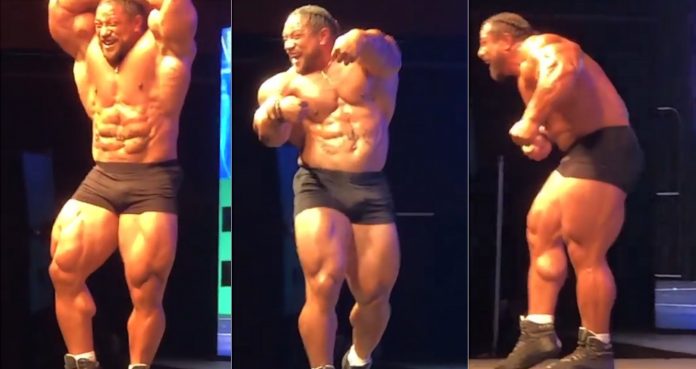
Roelly Winklaar Looks Massive in Recent Guest Posing
Roelly Winklaar showed off his massive physique at recent guest posing.
One of the most massive bodybuilders in the game today, Roelly Winklaar cuts an impressive frame on stage. He has the kind of size and musculature that places him at the top percentile of bodybuilders. Missing in action for quite some time, Roelly Winklaar made his return to the stage at a recent guest posing to the enjoyment of many hardcore bodybuilding fans.
When Winklaar was unable to to step on stage at the 2020 Olympia, many were greatly disappointed. His preparation appeared to be going extremely well and many believed he would have impressed at the 2020 show. With Big Ramy winning the show, it became apparent that anything is possible. Who knows, perhaps Winklaar would have been able to break the top 3 at the show. But we’ll never know.
What we do know now is that Roelly Winklaar is back and is looking as massive as ever. The veteran bodybuilder showcased a truly impressive frame at his recent guest posing at the 2021 Emerald Cup.
Return to the Stage
Taking place at the Meydenbauer Center in Washington, the Emerald Cup saw NPC competitors take to the stage to show off their hard earned gains. At the show Roelly Winklaar impressed the crowd with his insane physique. A number of onlookers were able to capture his posing from multiple different angles.
He is another post highlighting Roelly Winklaar taking to the stage.
What do you think of the current physique of Roelly Winklaar?
For more news and updates, follow Generation Iron on Facebook, Twitter, and Instagram.
Managing Editor at Generation Iron, Jonathan Salmon is a writer, martial arts instructor, and geek culture enthusiast. Check out his YouTube, Instagram, Twitter, Facebook, and Sound Cloud for in-depth MMA analysis.
